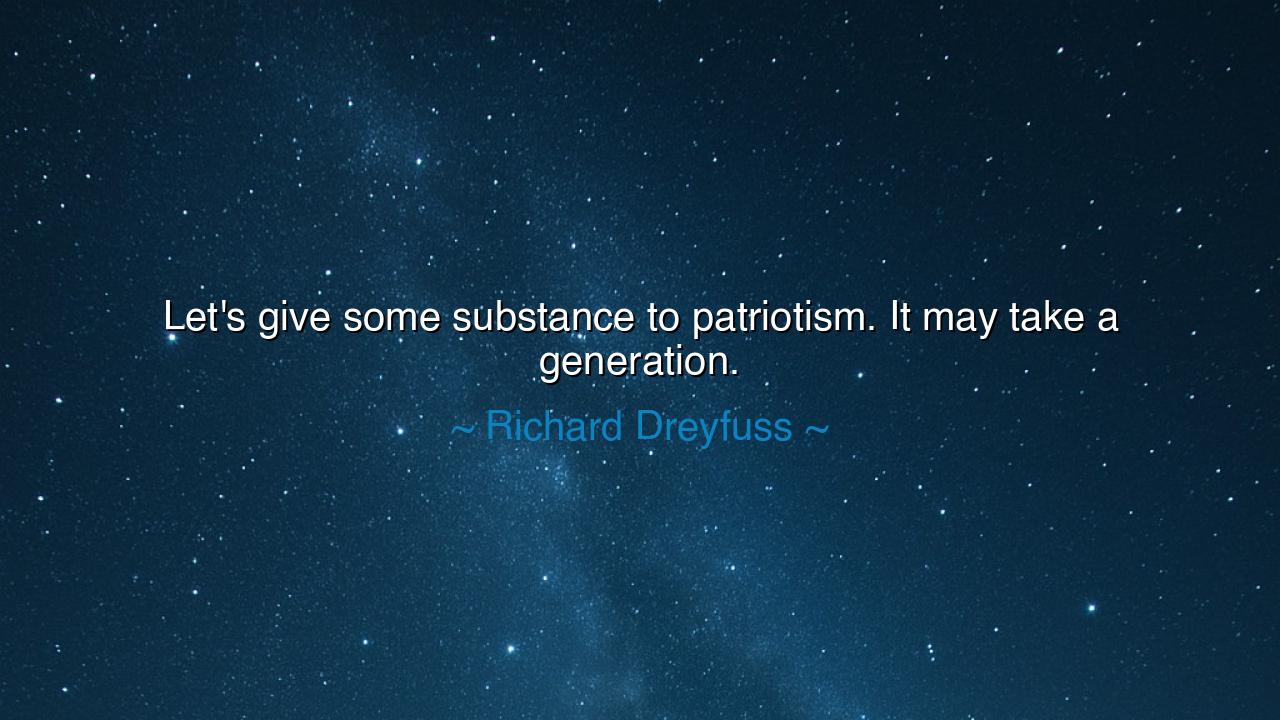
Let's give some substance to patriotism. It may take a






The words of Richard Dreyfuss—“Let’s give some substance to patriotism. It may take a generation.”—resound like the voice of a prophet weary of empty slogans, calling his people to awaken to a deeper truth. He does not dismiss patriotism, but he warns against its hollow form, where flags are waved without meaning, where loyalty is shouted without thought, where devotion is demanded without understanding. To “give substance” is to breathe life into a thing that has become a shadow, to restore strength where only form remains. Dreyfuss’s cry is not against love of country, but for a patriotism rich with wisdom, action, and truth.
At the heart of this declaration lies the recognition that nations too easily settle for symbols instead of virtues. A people may sing their anthem with passion yet forget the poor, may salute their flag with pride yet abandon justice. Such patriotism is only noise. Substance, as Dreyfuss declares, comes not from gestures but from commitment—commitment to education, to civic duty, to the daily labor of nurturing democracy. This is no easy task. To reshape the meaning of patriotism may require not merely years, but a full generation, for the seeds of truth planted today may not bear fruit until our children rise to harvest them.
History gives us many examples of nations struggling to fill their patriotism with substance. After the Civil War in the United States, the country waved its flag in triumph, but the deeper meaning of freedom was betrayed by the rise of segregation and injustice. It took generations of struggle—through the sacrifices of the civil rights movement—to begin giving true substance to the promise of liberty for all. Martin Luther King Jr. and countless others labored not to tear down patriotism, but to give it depth, to tie it not to empty pride but to real justice. Their work proves Dreyfuss’s point: such transformation is slow, yet essential.
We might also look to South Africa after apartheid. In the early years of freedom, it was not enough for the people simply to wave the new flag; they had to fill their patriotism with substance by building reconciliation, crafting a democracy, and seeking justice for wounds that ran deep. Nelson Mandela’s call for unity was not shallow sentiment—it was the demand for a new patriotism, one made real by sacrifice, forgiveness, and truth. That substance did not come in a moment; it came through decades of struggle, and it still continues today.
The ancients themselves spoke of this need for substance. Aristotle warned that a city is not preserved by ceremonies alone, but by cultivating virtue among its citizens. Cicero declared that the highest loyalty to the republic was not in words but in deeds that upheld justice. Dreyfuss, echoing these voices, urges us to abandon hollow displays and instead build a patriotism rooted in action, integrity, and education—the kind that will sustain a free people for generations.
The lesson for us is both humbling and hopeful: if we wish our patriotism to endure, we must labor to give it depth. This means teaching our children not merely to love their country in symbol, but to understand it in principle. It means anchoring loyalty not in blind pride, but in critical thought, justice, and responsibility. It means ensuring that future generations do not inherit only flags and anthems, but the wisdom to make them meaningful.
In daily life, this requires patience and perseverance. Volunteer in your community. Defend truth in public discourse. Teach the young the stories not only of triumph, but of struggle, so that they know patriotism is not free of burden. Seek justice, uphold fairness, and demand integrity from leaders. These small acts, multiplied over time, are the bricks with which the next generation will build a patriotism of substance.
Thus let Dreyfuss’s words echo like a commandment for our age: “Give substance to patriotism.” Let us not be content with empty symbols, but strive to make love of country a living force of justice, unity, and truth. If it takes a generation, then let us begin now, so that our children may inherit not just pride, but purpose. For only in substance does patriotism endure, and only through endurance can a nation truly thrive.






AAdministratorAdministrator
Welcome, honored guests. Please leave a comment, we will respond soon